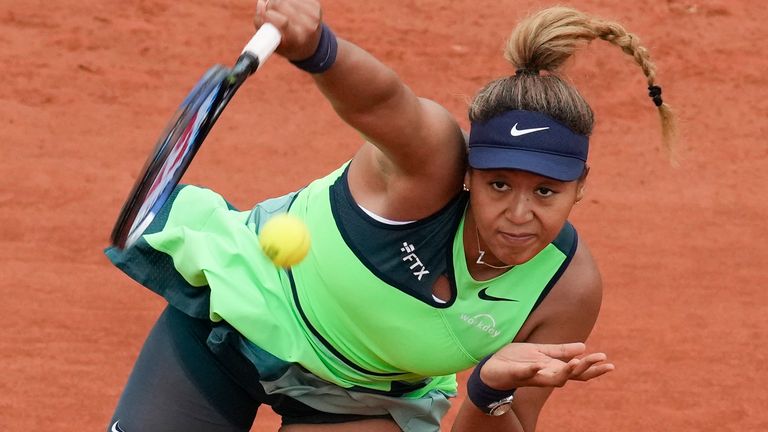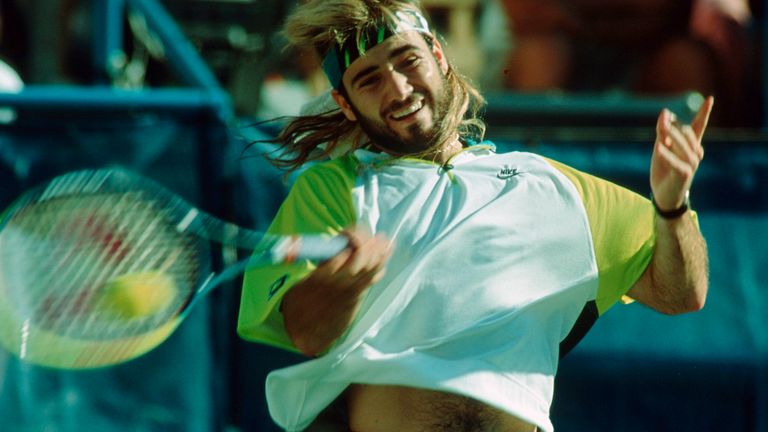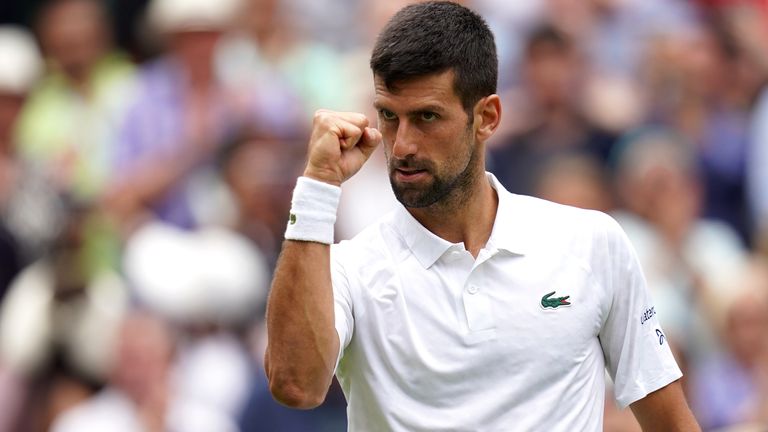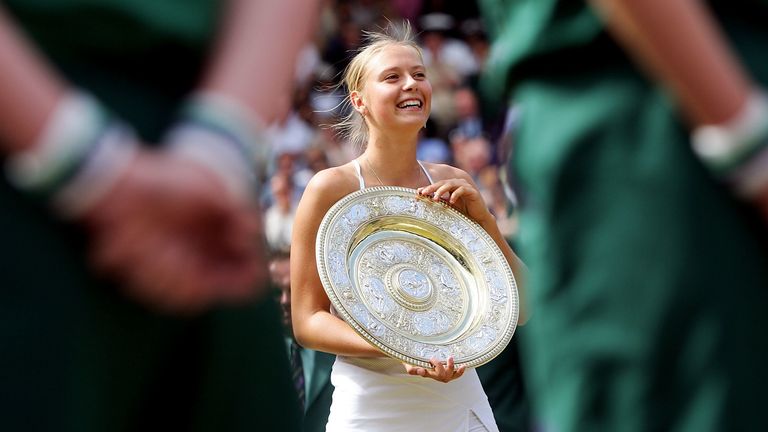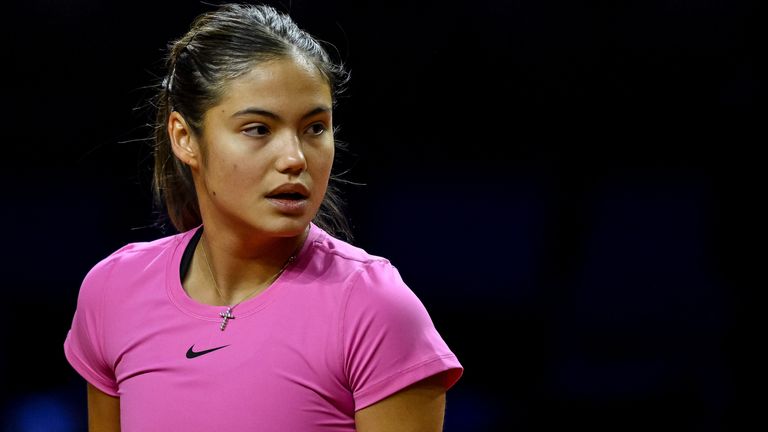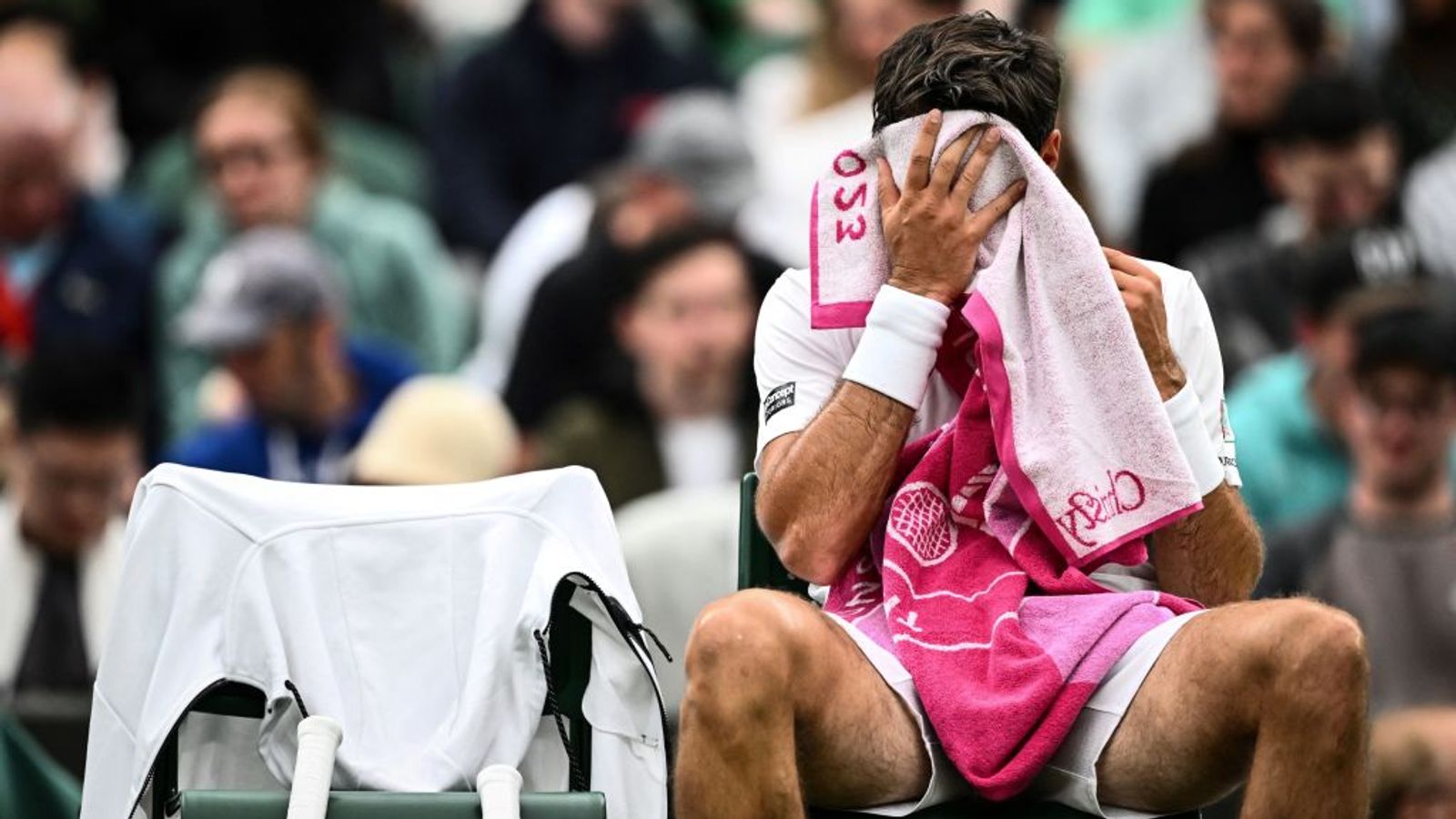
From the outside, the life of an elite tennis player could be viewed as one of glamour and appeal.
A career following the sun to compete in tournaments in all corners of the world against the cream of the crop and with potential for lucrative prize money and big figure sponsorship deals.
Wimbledon, like all of the Grand Slams and other major WTA and ATP tournaments, paints an inviting picture of the tennis circuit. For two weeks of the year, the British public are drawn in by the sights and sounds of an idyllic summer (outside of the rain delays) as the All England Club put their best face forward.
Yet the reality is a different story, with one leading sports psychologist calling it the loneliest and most emotionally challenging of sports.
Katie Mobed, who has been part of Team GB’s psychology support set up over the last 15 years, coaching and supporting athletes at the London, Rio, Tokyo Olympics and on preparing for the road to Paris 2024, told Sky Sports: “Of all the different sports I’ve worked in, and there have been many over the years, tennis is perhaps the most emotionally challenging of sports and there are so many reasons for that.
“It might look like a glamorous lifestyle and there are aspects of it that are very privileged for tennis players and they will speak openly about that. But the challenge is in terms of being away from home so much, and being away from loved ones and your support network and people you feel connected to. We’re wired to connect with others and be part of a tribe with your friends and your family.”
Mobed, who has also worked with Marcus Rashford and co-authored two children’s book with the England and Man Utd forward went on to add: “Being away from that support network has proven to heighten stress, even immune systems suffer the more we’re away from family and that’s before a player has even got onto the court.
“Then, when you’re in that cauldron of pressure, you’re on your own, there’s no team mate to get some support from. You’re under the judgement of the world’s media and fans and everyone wants their player to win.”
According to Mobed, tennis players have to “embrace failure on the path to success” and learn to “stay committed and stay confident” when they are essentially failing.
Naomi Osaka and Nick Kyrgios, among others, have been vocal about the struggles and pitfalls of life on the tour, while Andre Agassi wrote in his 2009 autobiography ‘Open’ about the solitude of a tennis player.
“Tennis is the sport in which you talk to yourself. No athletes talk to themselves like tennis players. Pitchers, golfers, goalkeepers, they mutter to themselves, of course, but tennis players talk to themselves – and answer. In the heat of a match, tennis players look like lunatics in a public square, ranting and swearing and conducting Lincoln-Douglas debates with their alter egos. Why? Because tennis is so damned lonely.”
Britain’s bright young prospect, 21-year-old Jack Draper, turned professional five years ago and is learning how best to manage life on tour and the challenges that go with it.
Draper, who had to sit out this year’s Wimbledon through injury, but climbed to a high of world No 38 at the start of the year, told Sky Sports: “Last year I had a good year and got onto the tour quite quickly and I can sit back now and say that maybe I didn’t appreciate it for what it was.
“Now, being off the court for a while and not being able to play in these tournaments has made me appreciate the fact I can play in front of a lot of people and express my tennis on the court. When I’m away I keep in touch with family. It’s obviously a bit of a lonely sport, but I’m very privileged to be in the position I’m in.
“There’s one side to it where you have a lot of friends supporting you and have your own team around you but it’s an individual sport and you have to go out there and experience all the emotions and be in the locker room by yourself before matches.
“The good thing as a player is that you’ve got to understand that whoever you’re playing against, they’re experiencing nothing different to you. They’re going to be a nervous wreck, they’re going to be struggling, whether they’re No 1 in the world, or at 300, they’re human and they do all the things that you’re doing.”
The scoring system can equally add to stress levels, according to Mobed, with players constantly ‘overwhelmed’ by a rollercoaster of emotions that can lead to poor decision making.
“Tennis is mental torture in some ways,” Mobed, who is working with younger people and schools to best prepare athletes of the future. “Even just the momentum swings. If you’re supporting a player who is 30-15 up, it feels quite comfortable. But within a couple of points, they are effectively in that penalty shoot-out situation and on the brink of losing their serve. Psychologically it’s incredibly tough.
“Studies have shown that players are only hitting the ball and playing actual tennis for around 10-15 minutes of every hour that they’re on court – and the rest, the towelling down, the changing ends between sets, between points, that’s the time when the mind can start to interfere and start to stress about how the game is going, how their form is, and their touch, there are so many opportunities for their mind to derail them if they haven’t trained it.”
According to Mobed, whose insights come as Vodafone, Official Connectivity Partner of Wimbledon, launched their Connection Fuels Champions campaign, which highlights the importance of emotional connection in sport, it is no surprise that the likes of Novak Djokovic, Roger Federer and Serena Williams put their success and longevity down to mental strength.
Yet how do you get to a point where you are content off the court and able to move past the isolated and disconnected nature of the sport?
Could friendship among players be the answer? Former Wimbledon champion Maria Sharapova said back in 2013 that she wasn’t close to many players, saying: “I think just because you’re in the same sport, it doesn’t mean that you have to be friends with everyone.”
Certainly Mobed encourages players to make friends outside of their own camps and tennis bubbles.
“If you look at the word competition, it comes from the Latin ‘competere’ which is to search together. I need my opponent to be on his or her best game, because that’s what’s going to help me find my best performance,” she said.
“If you can help athletes get behind the ego, there’s just a celebration of sport and what sport can inspire in others and that moment of mastery. There’s a switch on and a fierce ruthlessness that often athletes want to help train, but in moments when they’re off the court, I personally encourage that connection and friendship – and you’ve seen beautiful examples of that within tennis, more so than perhaps other sports.”
For Draper, who reached the third round of the US Open last year on his first appearance at Flushing Meadows and will hope to be fit and firing for the final Grand Slam of the year in August, live on Sky Sports, friendship is a big part of the game, although he admits it is a “weird dynamic” if you then have to go up against your friends on court.
During Wimbledon, Draper has been around the grounds, engaging with fans through his role as an ambassador with Vodafone and has been able to chat with compatriot Emma Raducanu about their ongoing injury issues among other things.
“I’ve known Emma since we were 10-years-old, we’ve been incredibly good friends for years,” he said. “Obviously with her injuries and struggles you know we can bounce off each other and understand, but each one of us is different, she’s experiencing life and things on a completely different scale of recognition and other factors of pressure.
“I try to be there as a friend. We were joking at Wimbledon this year that hopefully next year we’re going to be fit and ready to play and ready to do really well at this event. This is just the life of a tennis player and we can definitely bounce off each other as people who understand the emotions of it, and it feels good to know that you’re not alone in it.”
There are other ways players can alleviate the loneliness, taking a part of home with them on their travels, whether that’s a favourite photo or another item that takes them back to familiar surroundings.
“We often thrive when things are constant and predictable, that might sound a bit boring, but given we have this negativity bias and the way our brains are wired, consistency and predictability are really important,” Mobed said, while tennis fans at Wimbledon this year have been able to record messages of support for the homegrown players.
“With some tennis players I work with, there will be little strategies of taking photographs of your loved ones with you and when you get to your new hotel room, you put those photos out. Some take a little pot plant, it’s the little touches that make it feel a little more like home that you’re bringing some kind of connection to the people you love, or the places you love, or from pets.
“The amazing researcher Brene Brown described connection as when someone feels seen, heard and valued, and so the energy which can come from that is so incredibly powerful for us on a mental health level and on a performance level.
“If you are injured or ill, studies have shown that you can heal twice as fast if you have the support of friends and family around you because your immune system is able to work on healing as opposed to stressing about being lonely or disconnected.”
The phrase to maintain a positive mental attitude never has rang more true.
Follow coverage of Wimbledon in our daily live blog on the Sky Sports website and app

